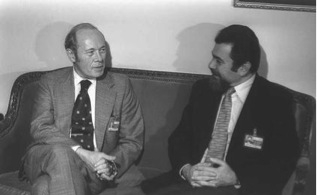
April 22, 1978
After Egyptian President Sadat’s historic visit to Jerusalem in November 1977, the United States seeks to move negotiations closer to an agreement between Israel and Egypt. Engaging full time in that endeavor is Alfred “Roy” Atherton, the U.S. Assistant Secretary of State.
Until the convening of the Camp David summit in September 1978, Atherton makes some nine visits to the Middle East to bring the two sides closer together. Atherton explains the U.S. view of the negotiations:
It is the U.S.’s judgment that it will not be possible to achieve agreement on principles that call for total withdrawal to the pre-1967 lines or for the unrestricted right of self- determination for the Palestinians, which the Israelis almost unanimously believe would lead inevitably to an independent state. Principles such as these, when applied to the West Bank and Gaza, provoke security concerns in Israel with which the U.S. sympathizes. President Sadat is also clearly on the record as being aware of Israel’s security needs.
From these laborious conversations and negotiations before Camp David, Atherton and other State Department officials draft substantial portions of the accords that Sadat and Begin will sign with Carter’s mediation in September 1978.
The photo shows Atherton (left) meeting with Eliyahu Ben-Elissar, Director-General of the Prime Minister’s Office in Cairo in December 1977. Ben-Elissar will become Israel’s first Ambassador to Egypt in 1980.
